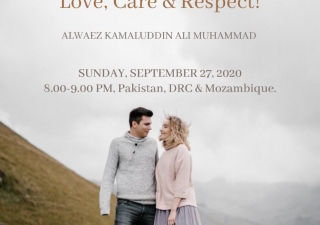National Conciliation and Arbitration Board
Throughout its history, the Shia Ismaili Muslim community has maintained a tradition of resolving disputes and differences through a voluntary process of mediation, conciliation and arbitration.
This video suggests some thought provoking reflections on our personal journey of matrimonial relationship, which can help us analyze & reflect on our past actions & to make our spousal relationships more stronger and pleasant in the future.
What does it mean to live within the ethics of Islam? How does this apply to those in conflict? This week, we explore how the ethics of Islam underpin the work of the CAB system how CAB mediators help to create an ethical culture of mediation.
Effective listening can be powerful. It demonstrates empathy, understanding, compassion, and most importantly, it shows care for what someone is saying. Active listening is not only a vital skill to help manage conflict, it can also help to improve our day-to-day interactions. In this video we explore the power of effective listening and the role of empathy in mediation.
We often hear of the need to employ best practice in our daily lives, not least when serving the community. In this video, we learn about the type of training that Conciliation and Arbitration Board (CAB) members receive, and how CABs use best practice in their training to assist parties with resolving disputes.
Video: Webinar Rishtey A Journey of Togetherness
Confidentiality is the foundation of the mediation process. But, what does it mean, and what information is considered to be confidential? In this video we learn about the role of confidentiality and why it is important to the mediation process.
Have you considered mediation? Mediation is a voluntary and confidential process in which a neutral third-party assists disputing parties to reach their own settlement. On day two of Mediation Week, we learn about mediation and how it can help to resolve a dispute in a peaceful and cost-effective manner.
The Ismaili International Conciliation and Arbitration Boards
Throughout its history, the Shia Ismaili Muslim community has maintained a tradition of resolving disputes and differences through a voluntary process of mediation, conciliation and arbitration.
View point differences are an inevitable part of our lives and become more visible during times of isolation. When one is faced with confrontation, our human instinct kicks into a Fight, Flight or Freeze mode.






